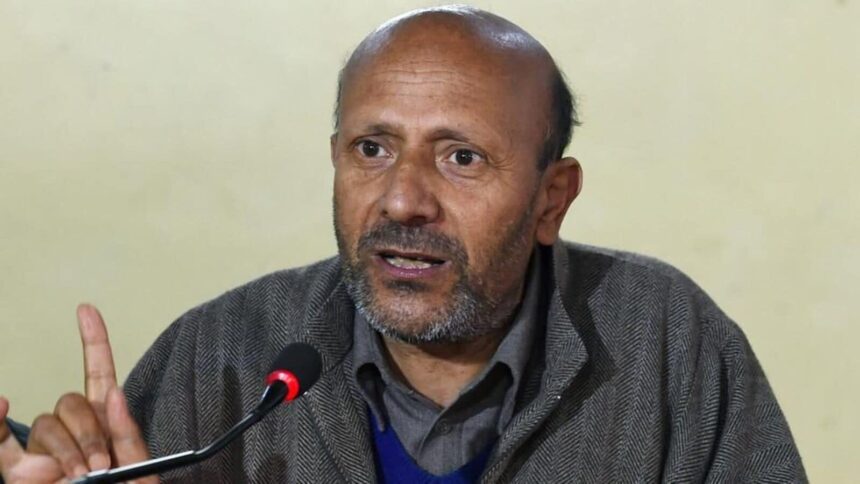The Delhi High Court granted a two-day custody parole to Baramulla Member of Parliament Rashid Engineer on Monday. He is implicated in a terror funding case and was permitted to attend the ongoing parliamentary session on February 11 and 13.
Rashid Engineer has been detained in connection with the terror funding matter. He ran for office in the Baramulla Lok Sabha constituency in 2024 from Tihar Jail and emerged victorious against Jammu and Kashmir Chief Minister Omar Abdullah.
Engineer Rashid’s brother and MLA Khursheed Ahmad Sheikh expressed joy, stating, “We are elated. He has been on a hunger strike for the past 11 days. I celebrate this moment, as he is now ending his hunger strike. Furthermore, the voices of 18 lakh people he represents will be heard in Parliament…”
Engineer Rashid’s Parole: Court Insights
The bench, led by Justice Vikas Mahajan, stated that Rashid Engineer would be escorted under close police supervision to and from the parliament.
The high court imposed several stipulations, including a prohibition on his usage of mobile phones, landlines, or the Internet. Additionally, Rashid is barred from speaking to the media or engaging with anyone during this time.
The high court explained that the custody parole was granted due to Rashid’s current lack of recourse concerning the evaluation of his bail application, which is delayed due to a dispute about which court has jurisdiction.
Justice Mahajan stated, “The custody parole is granted for two days, as there is currently no remedy available to him.”
On Friday, the high court reserved its order on an application requesting custody parole in order to attend the ongoing parliamentary session amid a jurisdictional conflict.
However, the National Investigation Agency (NIA), opposing Engineer’s request for custody parole, asserted that his plea was vague and highlighted that he had no speech to deliver.
Senior Advocate Sidharth Luthra represented the NIA and argued that taking an oath and campaigning are two distinct matters, but their authority to grant parole is limited. He also pointed out that this issue pertains to third-party norms, which fall outside the NIA’s jurisdiction.
The NIA further indicated that Engineer would require an armed escort, which is problematic, as armed personnel are prohibited in Parliament due to security protocols. The NIA noted that their objections may be irrelevant because the final decision rests with another body with its own regulations and security concerns.
Senior advocate N Hariharan, representing Rashid Engineer, argued that the Centre has reduced its allocation to Jammu & Kashmir by a thousand crores, emphasizing the urgency of presenting issues relevant to his constituency in Parliament. With only two days left in the first half of the session, he highlighted the urgency of raising these matters with the ministries.
After considering the arguments, Justice Vikas Mahajan’s bench reserved the order regarding the grant of custody parole. The principal petition has been set for hearing on February 11.
Engineer, currently detained in Tihar Jail on charges of terrorism under the Unlawful Activities (Prevention) Act, is primarily seeking regular bail.
During the hearing on Thursday, it was acknowledged that the Registrar General had submitted an application to the Supreme Court of India concerning the jurisdiction to consider Rashid Engineer’s bail plea in an NIA case.
This situation arose after the Special NIA Court (Trial Court) recently refused to hear the matter, stating it should fall under the jurisdiction of the MP/MLA court, given Rashid Engineer’s status as a Member of Parliament.
The counsel representing the Registrar General of the Delhi High Court informed the court that they have already approached the Supreme Court for clarification, and the matter could be heard next week.
The NIA recently recommended dismissing the interim bail request for Baramulla MP Engineer Rashid, asserting it was not maintainable and should be rejected on its merits. In its response, the NIA characterized this case as a blatant misuse of the interim bail provision, which should be utilized cautiously when severe distress is exhibited by the accused.
NIA further contended that the applicant/Rashid has not clearly articulated how he intends to serve his constituency, describing his statement that he wishes to “serve the constituency” as insufficient grounds for the granting of any relief. “Moreover, the work performed by the applicant/accused must be substantiated,” they stated.
Engineer’s counsel, Hariharan, stated that while his bail application was considered in August, the subsequent jurisdiction issue has left him without any recourse.
The counsel pointed out that his entire constituency should not remain unrepresented for an extended time, especially since he was not granted interim bail during the last session either. He noted that his regular bail application has been pending since September 2024.
Engineer moved the High Court after Additional Sessions Judge (ASJ) Chander Jit Singh, the special judge for NIA cases, declined to rule on his bail application on December 23, explaining that the court was only authorized to hear miscellaneous applications, not bail petitions.
He was arrested in August 2019 under the Unlawful Activities (Prevention) Act (UAPA). During his detention, he filed his nomination for the 2024 parliamentary elections from prison and won by a margin of 204,000 votes, defeating former Jammu and Kashmir Chief Minister Omar Abdullah.
In 2022, the NIA Court at Patiala House ordered the framing of charges against Rashid Engineer and several significant figures, including Hafiz Saeed, Syed Salahuddin, Yasin Malik, Shabbir Shah, Masrat Alam, Zahoor Ahmed Watali, Bitta Karate, Aftab Ahmed Shah, Avtar Ahmed Shah, Naeem Khan, and Bashir Ahmed Butt (also known as Peer Saifullah).
The charges are part of an ongoing investigation into terror financing in Jammu and Kashmir, where the National Investigation Agency (NIA) claims that several militant organizations, such as Lashkar-e-Taiba, Hizbul Mujahideen, Jaish-e-Mohammed, and JKLF, collaborated with Pakistan’s intelligence agency, ISI, to orchestrate attacks against civilians and security forces in the region.
The NIA’s investigation alleges that the All Party Hurriyat Conference (APHC) was established in 1993 to promote separatist activities, with funds channeled through hawala and other covert methods. Hafiz Saeed, along with Hurriyat leaders, is accused of utilizing these illicit funds to incite turmoil in Jammu and Kashmir, targeting security forces, fomenting violence, and vandalizing schools and public property.
The agency contends that these operations were designed to destabilize the region and advance terrorism disguised as political resistance.
Stay updated with all the latest business news, political developments, breaking news, events, and updates on Live Mint. Download The Mint News App for daily market updates.
MoreLess









